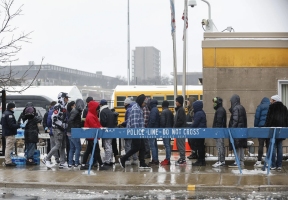By: Ashmar Mandou
 City of Chicago will no longer hold a migrant-only shelter system, Mayor Brandon Johnson announced during a press conference on Monday. Instead, the City will merge migrants into a traditional homeless shelter system. “We are shifting to a more cost-effective, equitable, and strategic approach that addresses homelessness for all who need support in the City of Chicago,” Chicago Mayor Brandon Johnson said. “This transition is in line with the sharp decline in migration to Chicago and our current budget realities.”
City of Chicago will no longer hold a migrant-only shelter system, Mayor Brandon Johnson announced during a press conference on Monday. Instead, the City will merge migrants into a traditional homeless shelter system. “We are shifting to a more cost-effective, equitable, and strategic approach that addresses homelessness for all who need support in the City of Chicago,” Chicago Mayor Brandon Johnson said. “This transition is in line with the sharp decline in migration to Chicago and our current budget realities.”
Mayor Johnson also announced the closure of the City’s “landing zone” for newly arrived migrants where shelter placements and resources were provided. The landing zone will close at the end of 2024 and is currently open from 8a.m., until 8p.m. The announcement comes as the number of migrants arriving to Chicago continues to decrease. At its peak in late-December, the city was housing about 14,900 migrants, but that has fallen to around 5,000, per reports, according to the City of Chicago. The overhaul will see 3,800 beds added to the city’s current homeless services system of 3,000 legacy beds in a new strategy being labeled as the One System Initiative (OSI). The new strategy aims to streamline operations and reduce the high cost of operating the migrant shelters, which have stretched the city’s budget.
Recently, Johnson issued grievances over the handling of migrants by Texas Republication Governor Greg Abbott during an unprecedented surge of migrants. “The efforts at the Texas border by Republican Governor Greg Abbott were meant to destabilize welcoming cities like Chicago, but the city responded with community care in welcoming nearly 50,000 new arrivals,” said Mayor Johnson. “The Johnson Administration is proud of the City agencies, community partners and government entities who successfully responded to an unprecedented humanitarian crisis.”
Chicago has received more than 50,000 migrants throughout the current crisis, many of them families. Johnson had attempted to raise $100 million by hiking taxes on properties worth more than $1 million in his “Bring Chicago Home” ballot measure, which ultimately failed. The merging of migrants into traditional homeless shelters has made people apprehensive over the lack of sufficient beds for migrants once the new system is in place as well as the upcoming winter. However, migrants who are in homeless shelters will no longer face evictions. The crisis has so far cost Chicago taxpayers nearly $200 million since it began and the city is facing a $982.4 million shortfall in 2025, according to WTTW.









